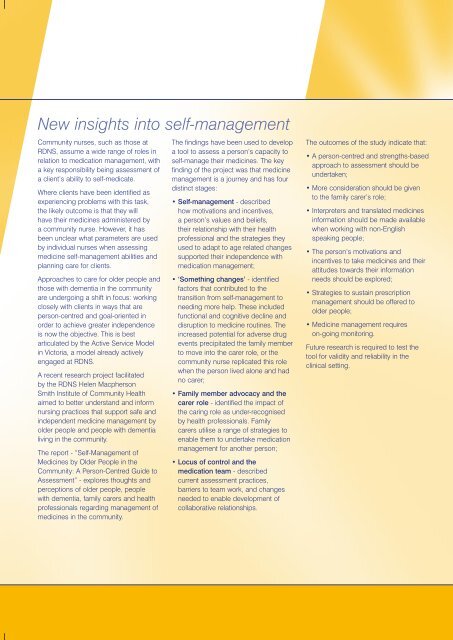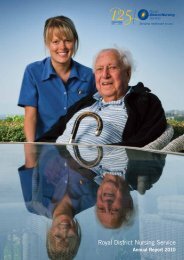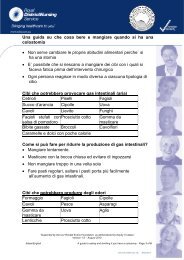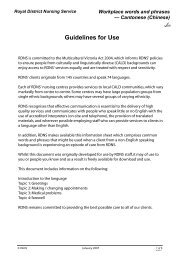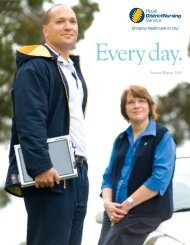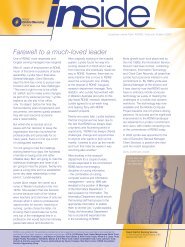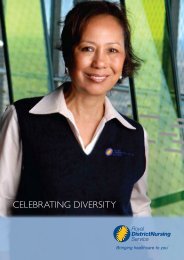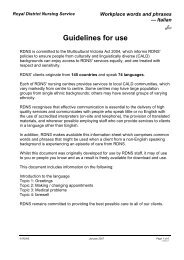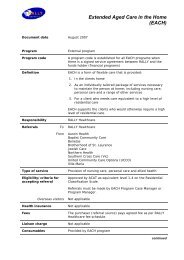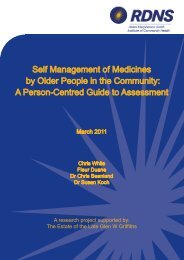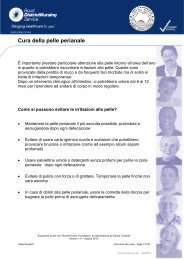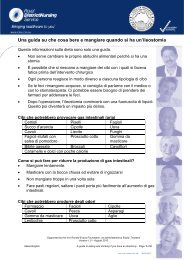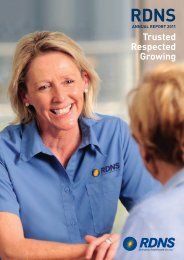Winter 2011 - Royal District Nursing Service
Winter 2011 - Royal District Nursing Service
Winter 2011 - Royal District Nursing Service
Create successful ePaper yourself
Turn your PDF publications into a flip-book with our unique Google optimized e-Paper software.
New insights into self-managementCommunity nurses, such as those atRDNS, assume a wide range of roles inrelation to medication management, witha key responsibility being assessment ofa client’s ability to self-medicate.Where clients have been identified asexperiencing problems with this task,the likely outcome is that they willhave their medicines administered bya community nurse. However, it hasbeen unclear what parameters are usedby individual nurses when assessingmedicine self-management abilities andplanning care for clients.Approaches to care for older people andthose with dementia in the communityare undergoing a shift in focus: workingclosely with clients in ways that areperson-centred and goal-oriented inorder to achieve greater independenceis now the objective. This is bestarticulated by the Active <strong>Service</strong> Modelin Victoria, a model already activelyengaged at RDNS.A recent research project facilitatedby the RDNS Helen MacphersonSmith Institute of Community Healthaimed to better understand and informnursing practices that support safe andindependent medicine management byolder people and people with dementialiving in the community.The report - “Self-Management ofMedicines by Older People in theCommunity: A Person-Centred Guide toAssessment” - explores thoughts andperceptions of older people, peoplewith dementia, family carers and healthprofessionals regarding management ofmedicines in the community.The findings have been used to developa tool to assess a person’s capacity toself-manage their medicines. The keyfinding of the project was that medicinemanagement is a journey and has fourdistinct stages:• Self-management - describedhow motivations and incentives,a person’s values and beliefs,their relationship with their healthprofessional and the strategies theyused to adapt to age related changessupported their independence withmedication management;• ‘Something changes’ - identifiedfactors that contributed to thetransition from self-management toneeding more help. These includedfunctional and cognitive decline anddisruption to medicine routines. Theincreased potential for adverse drugevents precipitated the family memberto move into the carer role, or thecommunity nurse replicated this rolewhen the person lived alone and hadno carer;• Family member advocacy and thecarer role - identified the impact ofthe caring role as under-recognisedby health professionals. Familycarers utilise a range of strategies toenable them to undertake medicationmanagement for another person;• Locus of control and themedication team - describedcurrent assessment practices,barriers to team work, and changesneeded to enable development ofcollaborative relationships.The outcomes of the study indicate that:• A person-centred and strengths-basedapproach to assessment should beundertaken;• More consideration should be givento the family carer’s role;• Interpreters and translated medicinesinformation should be made availablewhen working with non-Englishspeaking people;• The person’s motivations andincentives to take medicines and theirattitudes towards their informationneeds should be explored;• Strategies to sustain prescriptionmanagement should be offered toolder people;• Medicine management requireson-going monitoring.Future research is required to test thetool for validity and reliability in theclinical setting.


